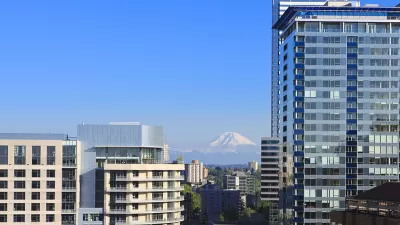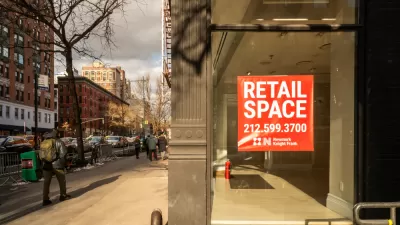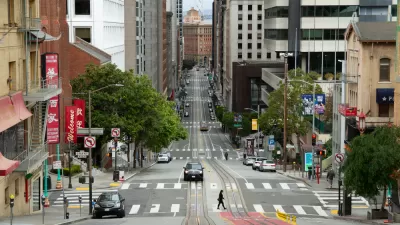The Bay Area Council and CBRE created an economic tracker to measure how well the nation's 25 largest metropolitan areas have recovered from the public health restrictions imposed on their regions at the onset of the pandemic.

“San Francisco’s recovery from the throes of the COVID-19 pandemic is one of the worst in the country among major metropolitan areas, according to an economic recovery tracker launched Tuesday by the Bay Area Council business group,” reports Eli Walsh of the Bay City News Foundation on Feb. 28.
That would be the San Francisco metropolitan statistical area, not the city. From a related, pandemic post:
Metros, or Metropolitan Statistical Areas (MSAs), are census-defined regions that consist of a city with 50,000 or more inhabitants and its surrounding communities.
The San Francisco–Oakland–Berkeley metro consists of five counties: Marin, San Francisco, San Mateo, Alameda and Contra Costa.
“Among the 25 largest metro areas in the country by regional gross domestic product, San Francisco’s pandemic recovery ranked 24th on the Regional Economic Recovery Index, besting only Baltimore,” adds Walsh.
San Jose fared better, but is still in the back half of the ranking at 16th. The Austin, Dallas and Denver metro areas have had the greatest recovery to date, according to the Bay Area Council.
The initial report by the council's Economic Institute, prepared in partnership with the commercial real estate services company CBRE and its Tech Insights Center, is the first of a three-year, three-part series of interactive reports focused on the Bay Area's economic recovery.
"The index portion of the project is focused on the 5 county San Francisco MSA (plus 2 county San Jose MSA)," wrote Abby Raisz of the Bay Area Council in an email on March 2. “The 'Bay Area Deep Dive' section includes charts that encompass the entire 9 county Bay Area.”
The region was the first in the nation to issue a "shelter in place order” on March 16, 2020, and appears almost last to recover from shutting down all but essential services in order to stem the transmission of the coronavirus that causes COVID-19.
“As the region recovers, it is clear that the pandemic has permanently changed how and where people work, how businesses think about their location decisions, and where households choose to live," notes the project summary of the report. “These effects appear to be most visible in expensive coastal regions, including the San Francisco Bay Area.”
Austin, Texas ranked first across the 25 regions in the study, scoring an average of 86 (out of 100) across the 15 metrics evaluated, according to the report's index methodology:
Within these metrics, it ranked first (100/100) on 6 metrics: job growth, “knowledge worker” growth, population growth, labor force growth, net absorption, and new housing units per capita. It also scored high (second only to Denver) on change in sales tax revenue – experiencing an increase of $33 million (or 13%) from 2019 to 2021.
These figures speak to the dramatic resilience and growth Austin, and Texas as a whole, experienced during the pandemic, while coastal cities like San Francisco and New York continue to suffer losses.
Related post detailing the population loss in the Bay Area: State Estimates Show Third Year of Population Loss for California, February 5, 2023,
Hat tip to my local paper, the San Mateo Daily Journal.
FULL STORY: SF pandemic recovery one of the worst in U.S. among largest metro areas

Planetizen Federal Action Tracker
A weekly monitor of how Trump’s orders and actions are impacting planners and planning in America.

Congressman Proposes Bill to Rename DC Metro “Trump Train”
The Make Autorail Great Again Act would withhold federal funding to the system until the Washington Metropolitan Area Transit Authority (WMATA), rebrands as the Washington Metropolitan Authority for Greater Access (WMAGA).

The Simple Legislative Tool Transforming Vacant Downtowns
In California, Michigan and Georgia, an easy win is bringing dollars — and delight — back to city centers.

The States Losing Rural Delivery Rooms at an Alarming Pace
In some states, as few as 9% of rural hospitals still deliver babies. As a result, rising pre-term births, no adequate pre-term care and harrowing close calls are a growing reality.

The Small South Asian Republic Going all in on EVs
Thanks to one simple policy change less than five years ago, 65% of new cars in this Himalayan country are now electric.

DC Backpedals on Bike Lane Protection, Swaps Barriers for Paint
Citing aesthetic concerns, the city is removing the concrete barriers and flexposts that once separated Arizona Avenue cyclists from motor vehicles.
Urban Design for Planners 1: Software Tools
This six-course series explores essential urban design concepts using open source software and equips planners with the tools they need to participate fully in the urban design process.
Planning for Universal Design
Learn the tools for implementing Universal Design in planning regulations.
Smith Gee Studio
City of Charlotte
City of Camden Redevelopment Agency
City of Astoria
Transportation Research & Education Center (TREC) at Portland State University
US High Speed Rail Association
City of Camden Redevelopment Agency
Municipality of Princeton (NJ)





























